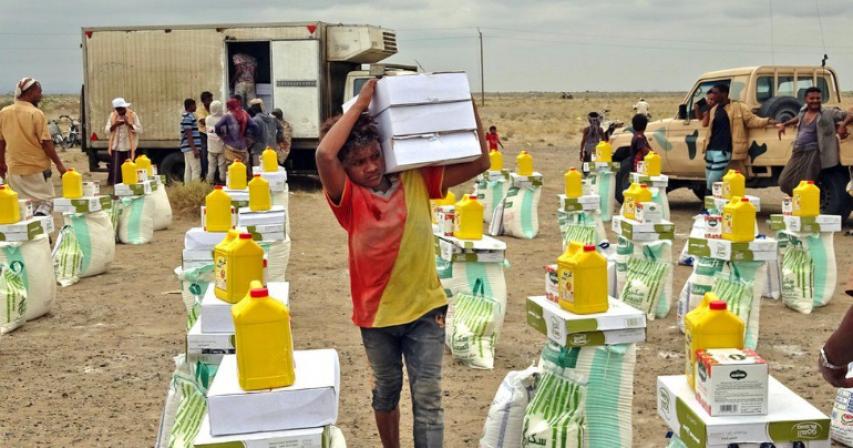Foreign aid - Charities criticise 'devastating' cuts ahead of G7
- 4 years ago

Families are going hungry and girls are missing school because of the UK's cuts to foreign aid spending, dozens of charities and academics have warned.
Charities including Oxfam and ActionAid UK said cuts had caused "devastation" that could undermine the UK's credibility at the upcoming G7 summit.
In a letter to Boris Johnson, they say there is "no justifiable economic need" for the cuts worth almost £4bn a year.
The government says it will still spend more than £10bn on foreign aid in 2021.
The letter comes ahead of a potential Commons vote on Monday when more than 30 rebel Tory MPs, including former Prime Minister Theresa May, hope to reverse the cuts.
Last year, ministers decided to reduce this year's spending on overseas aid from 0.7% of national income to 0.5%, saying it was hard to "justify" given that the UK faces record levels of borrowing to cope with the coronavirus pandemic.
But charities including Save the Children, WWF UK and Cafod, who also signed the letter, said the reduction had already led to the closure of feeding centres and clinics - and forced the cancellation of projects including water sanitation and training for healthcare workers.
The letter was shared with the BBC as the UK prepares to welcome leaders from the G7 group of major advanced economies to a summit in Cornwall.
Leaders from the US, Canada, France, Germany, Italy and Japan will join three days of face-to-face meetings from Friday, during their first visit to the UK since the pandemic was declared in March last year.
The charities say the foreign aid cuts will "cast a shadow" over the UK's ability to persuade G7 partners to pursue development goals, and any calls to do more on issues such as education and famine prevention would "ring hollow".
"While other G7 countries have stepped up their aid budget, the UK is the only one to have rowed back on its commitments," they said.
"As a result, families are going hungry, girls are not going to school, women's rights are being sidelined, persons with disabilities are being further left behind, vaccines are expiring on shelves, and diseases are being allowed to spread and we are reneging on our commitment to lead from the front on tackling climate-change."
The charities added that reducing aid during the pandemic was a "double blow to the world's poorest communities".
The letter was co-ordinated by Bond, a UK umbrella group for international development charities, and was signed by more than 1,700 academics, charities and business leaders.
What is foreign aid and who does it help?
Foreign aid is resources given from one country to another. It can involve a transfer of things like food or military equipment, or even people to provide training and medical help.
In 2020, Britain spent £14.5bn on aid, meeting its 0.7% target, according to provisional data.
Overall, the top five countries receiving UK aid were Pakistan, Ethiopia, Afghanistan, Yemen and Nigeria, with almost all the money going to countries in Africa and Asia.
The government said the foreign aid cuts were temporary, and has pledged to restore spending to 0.7% "when the fiscal situation allows" - but it has not specified a date.
In their letter, the charities said forecasts predicting an economic rebound to pre-pandemic levels by the end of 2021 showed there is "no justifiable economic need to continue to break our promise to the world's most marginalised people".
Ministers cut the spending without changing a 2015 law, which made the 0.7% target legally binding. The move has led to criticism from opposition and Conservative MPs, some of whom have argued it is unlawful.
Tory rebel vote
More than 30 Tory rebels, including former ministers Damian Green, Stephen Crabb and Johnny Mercer, say they are planning to reverse the cuts on Monday by voting to amend legislation related to a new scientific research agency.
Their amendment - which will need the support of more Tory MPs to pass - would oblige the agency to make up any shortfall from the 0.7% target from January 2022.
But it will be up to Commons Speaker Lindsay Hoyle to decide on Monday whether the amendment is within the scope of the bill and whether it should be put to a vote.
On Friday, former Prime Minister Sir John Major reiterated his call for the cuts to be reversed, saying they were not "morally defensible".
In response to the letter, a government spokesman told the BBC: "While the seismic impact of the pandemic has forced us to take tough but necessary decisions, the government is committed to returning to spending 0.7% of GNI [gross national income] on aid when the fiscal situation allows."
Source: BBC
Comments